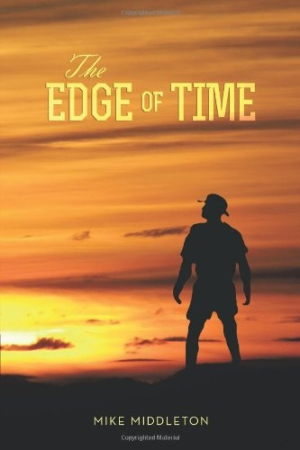The Edge of Time
Mike Middleton’s quiet, simple science fiction novel with an environmental message is guardedly positive and hopeful, yet it also has undertones of a cautionary tale related to humanity’s abuse of a planet it has taken for granted.
“When a species gets super dominant in terms of overcoming threats and exploiting resources, it can do so without understanding the ultimate consequences,” opines Viktor, the cosmonaut-turned-professor and key supporting character in The Edge of Time. “Humans have historically seen the planet as limitless. But it isn’t. That fact is clear once you’ve seen Earth from space.”
Viktor, of course, has seen the planet from above. So too have the Lanretians, highly evolved human-like inhabitants of a distant world that sent a living probe named Thomas to explore Earth. That Thomas is a clone created from DNA mined from bodily waste evacuated from Viktor’s spaceship is, unfortunately, revealed on the back cover, lessening the dramatic impact.
The characters eventually meet in Hobart, Tasmania. Middleton’s choice of Tasmania and, before that, the wilds of sparsely populated central Australia, allows Thomas to see the natural beauty of Earth and to observe and interact with a small sample of the population—including being welcomed into a family and into a lovely young woman’s bed.
The Edge of Time has much in common with director John Carpenter’s 1984 classic, Starman. Thomas is quite similar to the character played by Jeff Bridges in that movie, in that the audience gets to share in the experiences of exploring a new world—and in a quiet, rural setting with very few people to complicate things.
There are the expected responses from people who learn from Thomas that he is not the wandering lost soul they at first think him to be. “If anyone had told me a week ago I would be talking quite openly and comfortably with a person from another planet, I’d have said they were bonkers,” quips Ruth, the daughter in the family that takes him in and whose romantic interest is piqued (and telegraphed by the author) from their first meeting.
The Edge of Time is short, barely more than a novella, and reads easily. The prose is simple and flows nicely, and the interjections of slang are limited just enough to give the book a soupçon of local flavoring rather than drowning the dialogue in dialect. There are two parallel stories—Thomas’s and Viktor’s—which eventually intertwine, and what the book lacks in drama and excitement it makes up for in lightly humorous encounters and pleasant exchanges.
Middleton has elected to forgo the fear, awe, or even disbelief that meetings with alien life forms frequently generate in science fiction, in favor of a rather blasé acceptance of one genuinely nice visitor by his equally polite and gentle hosts. That choice is refreshing and is the key to understanding the story, the characters, and the point of the novel.
This is “first contact” on a very quiet and familial level, with very little drama and even less conflict. While this makes for a less exciting plot, it does make for a peaceful and thoughtful read.
Reviewed by
Mark McLaughlin
Disclosure: This article is not an endorsement, but a review. The publisher of this book provided free copies of the book and paid a small fee to have their book reviewed by a professional reviewer. Foreword Reviews and Clarion Reviews make no guarantee that the publisher will receive a positive review. Foreword Magazine, Inc. is disclosing this in accordance with the Federal Trade Commission’s 16 CFR, Part 255.

